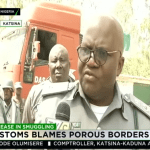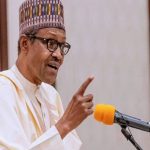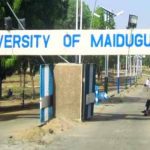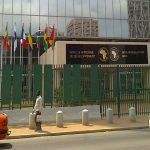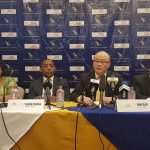President Cyril Ramaphosa of South Africa has formally formed a new border force in an effort to restrict the country’s porous borders.
The ceremony was held at Musina, which is home to the major Beitbridge border post with Zimbabwe.
According to Mr. Ramaphosa, an increase in the number of illegal foreign people has “exacerbated many of the country’s social and economic problems.”
Immigration is one of South Africa’s most pressing political issues.
Managing its borders has become disorganised, with pressure on the government to do more to reduce the numbers of people coming into sub-Saharan Africa’s most developed country from its neighbours.
At the same time, xenophobia by political parties is fanning flames ahead of the 2024 elections, to mobilise support from dissatisfied South Africans.
But now the Border Management Authority, which cost millions of dollars to set up, is South Africa’s third law enforcement agency after the police and army.
The establishment of the agency means South Africa now has an integrated border policing bureau with a single command and control.
Hundreds of border guards have been recruited and will be working together with the defence force. They will be manning South Africa’s ports of entry which include eight seaports, 52 land borders and eleven international airports.
Mr Ramaphosa said the Border Management Authority was a vital link in harnessing the benefits of the African Continental Free Trade Area, as well as curbing illegal migration and human trafficking.
A multi-million-dollar fence which was erected between South Africa and Zimbabwe collapsed, making it difficult to stop illegal immigration.
South Africa conducted a census in 2022, with the results expected to be released on 10 October.
Data released following the 2011 census revealed that 3.96 million foreign-born people lived in South Africa, including undocumented migrants. Statistics South Africa said this translates to about 6% of the country’s population.
Many believe the number of illegal immigrants could be much higher, as the government is often accused of not taking bolder steps to tackle the influx of undocumented foreigners.
President Cyril Ramaphosa of South Africa has formally formed a new border force in an effort to restrict the country’s porous borders.
The ceremony was held at Musina, which is home to the major Beitbridge border post with Zimbabwe.
According to Mr. Ramaphosa, an increase in the number of illegal foreign people has “exacerbated many of the country’s social and economic problems.”
Immigration is one of South Africa’s most pressing political issues.
Managing its borders has become disorganised, with pressure on the government to do more to reduce the numbers of people coming into sub-Saharan Africa’s most developed country from its neighbours.
At the same time, xenophobia by political parties is fanning flames ahead of the 2024 elections, to mobilise support from dissatisfied South Africans.
But now the Border Management Authority, which cost millions of dollars to set up, is South Africa’s third law enforcement agency after the police and army.
The establishment of the agency means South Africa now has an integrated border policing bureau with a single command and control.
Hundreds of border guards have been recruited and will be working together with the defence force. They will be manning South Africa’s ports of entry which include eight seaports, 52 land borders and eleven international airports.
Mr Ramaphosa said the Border Management Authority was a vital link in harnessing the benefits of the African Continental Free Trade Area, as well as curbing illegal migration and human trafficking.
A multi-million-dollar fence which was erected between South Africa and Zimbabwe collapsed, making it difficult to stop illegal immigration.
South Africa conducted a census in 2022, with the results expected to be released on 10 October.
Data released following the 2011 census revealed that 3.96 million foreign-born people lived in South Africa, including undocumented migrants. Statistics South Africa said this translates to about 6% of the country’s population.
Many believe the number of illegal immigrants could be much higher, as the government is often accused of not taking bolder steps to tackle the influx of undocumented foreigners.
President Cyril Ramaphosa of South Africa has formally formed a new border force in an effort to restrict the country’s porous borders.
The ceremony was held at Musina, which is home to the major Beitbridge border post with Zimbabwe.
According to Mr. Ramaphosa, an increase in the number of illegal foreign people has “exacerbated many of the country’s social and economic problems.”
Immigration is one of South Africa’s most pressing political issues.
Managing its borders has become disorganised, with pressure on the government to do more to reduce the numbers of people coming into sub-Saharan Africa’s most developed country from its neighbours.
At the same time, xenophobia by political parties is fanning flames ahead of the 2024 elections, to mobilise support from dissatisfied South Africans.
But now the Border Management Authority, which cost millions of dollars to set up, is South Africa’s third law enforcement agency after the police and army.
The establishment of the agency means South Africa now has an integrated border policing bureau with a single command and control.
Hundreds of border guards have been recruited and will be working together with the defence force. They will be manning South Africa’s ports of entry which include eight seaports, 52 land borders and eleven international airports.
Mr Ramaphosa said the Border Management Authority was a vital link in harnessing the benefits of the African Continental Free Trade Area, as well as curbing illegal migration and human trafficking.
A multi-million-dollar fence which was erected between South Africa and Zimbabwe collapsed, making it difficult to stop illegal immigration.
South Africa conducted a census in 2022, with the results expected to be released on 10 October.
Data released following the 2011 census revealed that 3.96 million foreign-born people lived in South Africa, including undocumented migrants. Statistics South Africa said this translates to about 6% of the country’s population.
Many believe the number of illegal immigrants could be much higher, as the government is often accused of not taking bolder steps to tackle the influx of undocumented foreigners.
President Cyril Ramaphosa of South Africa has formally formed a new border force in an effort to restrict the country’s porous borders.
The ceremony was held at Musina, which is home to the major Beitbridge border post with Zimbabwe.
According to Mr. Ramaphosa, an increase in the number of illegal foreign people has “exacerbated many of the country’s social and economic problems.”
Immigration is one of South Africa’s most pressing political issues.
Managing its borders has become disorganised, with pressure on the government to do more to reduce the numbers of people coming into sub-Saharan Africa’s most developed country from its neighbours.
At the same time, xenophobia by political parties is fanning flames ahead of the 2024 elections, to mobilise support from dissatisfied South Africans.
But now the Border Management Authority, which cost millions of dollars to set up, is South Africa’s third law enforcement agency after the police and army.
The establishment of the agency means South Africa now has an integrated border policing bureau with a single command and control.
Hundreds of border guards have been recruited and will be working together with the defence force. They will be manning South Africa’s ports of entry which include eight seaports, 52 land borders and eleven international airports.
Mr Ramaphosa said the Border Management Authority was a vital link in harnessing the benefits of the African Continental Free Trade Area, as well as curbing illegal migration and human trafficking.
A multi-million-dollar fence which was erected between South Africa and Zimbabwe collapsed, making it difficult to stop illegal immigration.
South Africa conducted a census in 2022, with the results expected to be released on 10 October.
Data released following the 2011 census revealed that 3.96 million foreign-born people lived in South Africa, including undocumented migrants. Statistics South Africa said this translates to about 6% of the country’s population.
Many believe the number of illegal immigrants could be much higher, as the government is often accused of not taking bolder steps to tackle the influx of undocumented foreigners.
President Cyril Ramaphosa of South Africa has formally formed a new border force in an effort to restrict the country’s porous borders.
The ceremony was held at Musina, which is home to the major Beitbridge border post with Zimbabwe.
According to Mr. Ramaphosa, an increase in the number of illegal foreign people has “exacerbated many of the country’s social and economic problems.”
Immigration is one of South Africa’s most pressing political issues.
Managing its borders has become disorganised, with pressure on the government to do more to reduce the numbers of people coming into sub-Saharan Africa’s most developed country from its neighbours.
At the same time, xenophobia by political parties is fanning flames ahead of the 2024 elections, to mobilise support from dissatisfied South Africans.
But now the Border Management Authority, which cost millions of dollars to set up, is South Africa’s third law enforcement agency after the police and army.
The establishment of the agency means South Africa now has an integrated border policing bureau with a single command and control.
Hundreds of border guards have been recruited and will be working together with the defence force. They will be manning South Africa’s ports of entry which include eight seaports, 52 land borders and eleven international airports.
Mr Ramaphosa said the Border Management Authority was a vital link in harnessing the benefits of the African Continental Free Trade Area, as well as curbing illegal migration and human trafficking.
A multi-million-dollar fence which was erected between South Africa and Zimbabwe collapsed, making it difficult to stop illegal immigration.
South Africa conducted a census in 2022, with the results expected to be released on 10 October.
Data released following the 2011 census revealed that 3.96 million foreign-born people lived in South Africa, including undocumented migrants. Statistics South Africa said this translates to about 6% of the country’s population.
Many believe the number of illegal immigrants could be much higher, as the government is often accused of not taking bolder steps to tackle the influx of undocumented foreigners.
President Cyril Ramaphosa of South Africa has formally formed a new border force in an effort to restrict the country’s porous borders.
The ceremony was held at Musina, which is home to the major Beitbridge border post with Zimbabwe.
According to Mr. Ramaphosa, an increase in the number of illegal foreign people has “exacerbated many of the country’s social and economic problems.”
Immigration is one of South Africa’s most pressing political issues.
Managing its borders has become disorganised, with pressure on the government to do more to reduce the numbers of people coming into sub-Saharan Africa’s most developed country from its neighbours.
At the same time, xenophobia by political parties is fanning flames ahead of the 2024 elections, to mobilise support from dissatisfied South Africans.
But now the Border Management Authority, which cost millions of dollars to set up, is South Africa’s third law enforcement agency after the police and army.
The establishment of the agency means South Africa now has an integrated border policing bureau with a single command and control.
Hundreds of border guards have been recruited and will be working together with the defence force. They will be manning South Africa’s ports of entry which include eight seaports, 52 land borders and eleven international airports.
Mr Ramaphosa said the Border Management Authority was a vital link in harnessing the benefits of the African Continental Free Trade Area, as well as curbing illegal migration and human trafficking.
A multi-million-dollar fence which was erected between South Africa and Zimbabwe collapsed, making it difficult to stop illegal immigration.
South Africa conducted a census in 2022, with the results expected to be released on 10 October.
Data released following the 2011 census revealed that 3.96 million foreign-born people lived in South Africa, including undocumented migrants. Statistics South Africa said this translates to about 6% of the country’s population.
Many believe the number of illegal immigrants could be much higher, as the government is often accused of not taking bolder steps to tackle the influx of undocumented foreigners.
President Cyril Ramaphosa of South Africa has formally formed a new border force in an effort to restrict the country’s porous borders.
The ceremony was held at Musina, which is home to the major Beitbridge border post with Zimbabwe.
According to Mr. Ramaphosa, an increase in the number of illegal foreign people has “exacerbated many of the country’s social and economic problems.”
Immigration is one of South Africa’s most pressing political issues.
Managing its borders has become disorganised, with pressure on the government to do more to reduce the numbers of people coming into sub-Saharan Africa’s most developed country from its neighbours.
At the same time, xenophobia by political parties is fanning flames ahead of the 2024 elections, to mobilise support from dissatisfied South Africans.
But now the Border Management Authority, which cost millions of dollars to set up, is South Africa’s third law enforcement agency after the police and army.
The establishment of the agency means South Africa now has an integrated border policing bureau with a single command and control.
Hundreds of border guards have been recruited and will be working together with the defence force. They will be manning South Africa’s ports of entry which include eight seaports, 52 land borders and eleven international airports.
Mr Ramaphosa said the Border Management Authority was a vital link in harnessing the benefits of the African Continental Free Trade Area, as well as curbing illegal migration and human trafficking.
A multi-million-dollar fence which was erected between South Africa and Zimbabwe collapsed, making it difficult to stop illegal immigration.
South Africa conducted a census in 2022, with the results expected to be released on 10 October.
Data released following the 2011 census revealed that 3.96 million foreign-born people lived in South Africa, including undocumented migrants. Statistics South Africa said this translates to about 6% of the country’s population.
Many believe the number of illegal immigrants could be much higher, as the government is often accused of not taking bolder steps to tackle the influx of undocumented foreigners.
President Cyril Ramaphosa of South Africa has formally formed a new border force in an effort to restrict the country’s porous borders.
The ceremony was held at Musina, which is home to the major Beitbridge border post with Zimbabwe.
According to Mr. Ramaphosa, an increase in the number of illegal foreign people has “exacerbated many of the country’s social and economic problems.”
Immigration is one of South Africa’s most pressing political issues.
Managing its borders has become disorganised, with pressure on the government to do more to reduce the numbers of people coming into sub-Saharan Africa’s most developed country from its neighbours.
At the same time, xenophobia by political parties is fanning flames ahead of the 2024 elections, to mobilise support from dissatisfied South Africans.
But now the Border Management Authority, which cost millions of dollars to set up, is South Africa’s third law enforcement agency after the police and army.
The establishment of the agency means South Africa now has an integrated border policing bureau with a single command and control.
Hundreds of border guards have been recruited and will be working together with the defence force. They will be manning South Africa’s ports of entry which include eight seaports, 52 land borders and eleven international airports.
Mr Ramaphosa said the Border Management Authority was a vital link in harnessing the benefits of the African Continental Free Trade Area, as well as curbing illegal migration and human trafficking.
A multi-million-dollar fence which was erected between South Africa and Zimbabwe collapsed, making it difficult to stop illegal immigration.
South Africa conducted a census in 2022, with the results expected to be released on 10 October.
Data released following the 2011 census revealed that 3.96 million foreign-born people lived in South Africa, including undocumented migrants. Statistics South Africa said this translates to about 6% of the country’s population.
Many believe the number of illegal immigrants could be much higher, as the government is often accused of not taking bolder steps to tackle the influx of undocumented foreigners.



